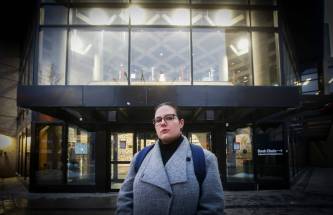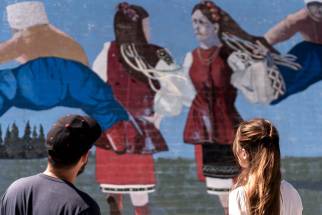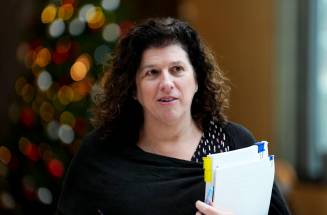Lost on Selkirk Avenue Film follows Ukrainian immigrant as she navigates the mysterious foods, cultures and languages of North End thoroughfare
Read this article for free:
or
Already have an account? Log in here »
To continue reading, please subscribe:
Monthly Digital Subscription
$0 for the first 4 weeks*
- Enjoy unlimited reading on winnipegfreepress.com
- Read the E-Edition, our digital replica newspaper
- Access News Break, our award-winning app
- Play interactive puzzles
*No charge for 4 weeks then price increases to the regular rate of $19.00 plus GST every four weeks. Offer available to new and qualified returning subscribers only. Cancel any time.
Monthly Digital Subscription
$4.75/week*
- Enjoy unlimited reading on winnipegfreepress.com
- Read the E-Edition, our digital replica newspaper
- Access News Break, our award-winning app
- Play interactive puzzles
*Billed as $19 plus GST every four weeks. Cancel any time.
To continue reading, please subscribe:
Add Free Press access to your Brandon Sun subscription for only an additional
$1 for the first 4 weeks*
*Your next subscription payment will increase by $1.00 and you will be charged $16.99 plus GST for four weeks. After four weeks, your payment will increase to $23.99 plus GST every four weeks.
Read unlimited articles for free today:
or
Already have an account? Log in here »
Hey there, time traveller!
This article was published 13/12/2022 (1097 days ago), so information in it may no longer be current.
Selkirk Avenue has been the first stop for generations of newcomers to Winnipeg.
The North End thoroughfare welcomes its latest immigrant, albeit a cinematic one, in Deco Dawson’s new movie Diaspora, which receives its Winnipeg première tonight at the Dave Barber Cinematheque.
Movie preview
Diaspora
Directed by Deco Dawson
• Wednesday, 7 p.m.
• Dave Barber Cinematheque
“A lot of immigrants for the past 135 years have settled in the Selkirk Avenue area, and for decade after decade after decade, different immigrant groups have come through that neighbourhood, leaving their own mark, leaving their own remnants and their temples and their statues and their memorials and heroes,” says the city filmmaker, who’s directed many short films and documentaries but makes his feature-film debut with Diaspora.
The film is about Eva (Yulia Guzhva) a young Ukrainian woman who settles in an apartment on Selkirk Avenue only to learn it’s a rather unsettling place.
She arrives in a new city with mysterious cultures, customs and foods. People she meets speak many different languages but none of them are ones she understands, and Eva tries to keep her cool while confusion swirls around her.
”The whole movie is the portrait of this character Eva. What we experience in our lives, it’s not always glamorous,” Dawson says. “We have moments of boredom in our lives and moments of jubilation, but also moments of lonesomeness, despair, danger, of threat.”
Adding to the alienation Dawson’s film creates are its lack of subtitles. Only Eva’s words in Ukrainian are translated in the film. Viewers are left in the same uncertainty that Eva feels.
Selkirk Avenue has gained a dangerous and threatening reputation over the years, even for Winnipeggers who’ve lived in the city all their lives.
“It’s not in any of the tourism brochures,” Dawson says. “(At Winnipeg Jets games) they’re not showcasing Selkirk Avenue on the big megatron (scoreboard) there or on the TSN broadcasts.
“Here we have a Winnipeg that I feel a large number of Winnipeggers won’t even recognize. A city that looks so different from what we’re used to seeing about Winnipeg, but it’s there.”
Count Dawson among those those Winnipeggers who have overlooked Selkirk Avenue and the North End. He’s from a Ukrainian-Canadian family, and he spent his formative years visiting the area, going to church at the Holy Trinity Ukrainian Orthodox Metropolitan Cathedral at Main Street and Redwood Avenue and getting to know the neighbourhood.
SUPPLIED Diaspora director Deco Dawson and actress Yulia Guzhva check out a mural in the North End during shooting.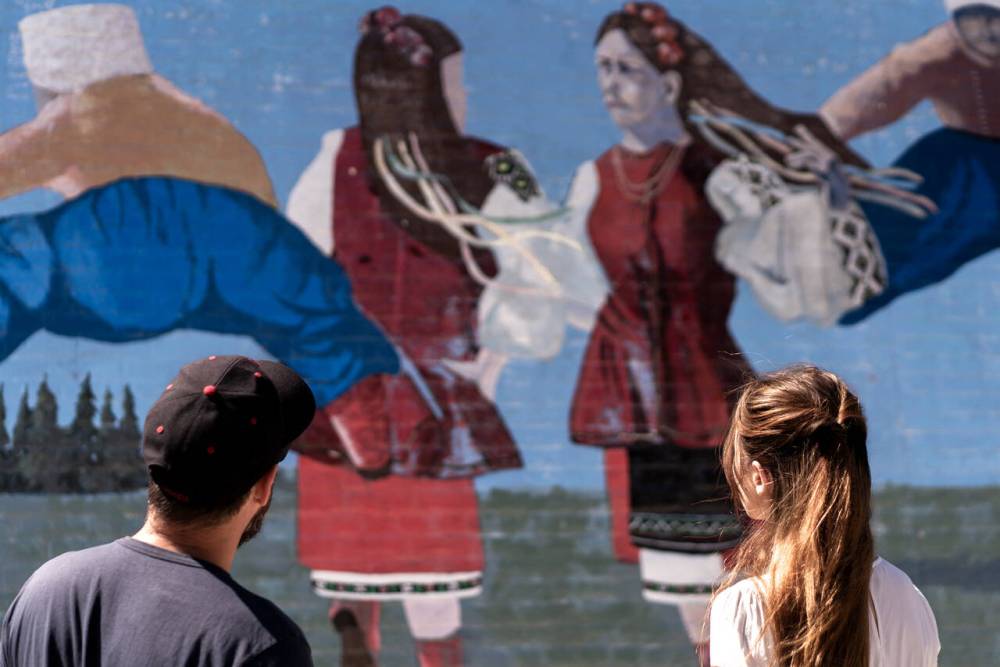
He saw the North End with a new perspective, and greater inspiration, after giving noted American director Jim Jarmusch a tour, which included Selkirk Avenue, in 2015.
“As we were driving through, (I said), ‘This is such a great Jim Jarmusch movie,’ and he turned to me and he said. ‘This is a great Deco Dawson movie,’ ” Dawson remembers. “All the wheels started chugging… Take the existing locations and build a narrative out of that. I never thought I’d do that in my career.”
So he walked endlessly along Selkirk and visited shopkeepers and businesses, some of which have since closed. After filming, Dawson took microphones back to Selkirk Avenue to record the sounds of the street to match the film as well.
Eagle Vision, the Manitoba film and television production company, got on board in 2019, but Diaspora was put on hold, like so many other entertainment projects during the COVID-19 pandemic, in March 2020.
SUPPLIED Actress Yulia Guzhva and director Deco Dawson share a laugh on the set of Diaspora.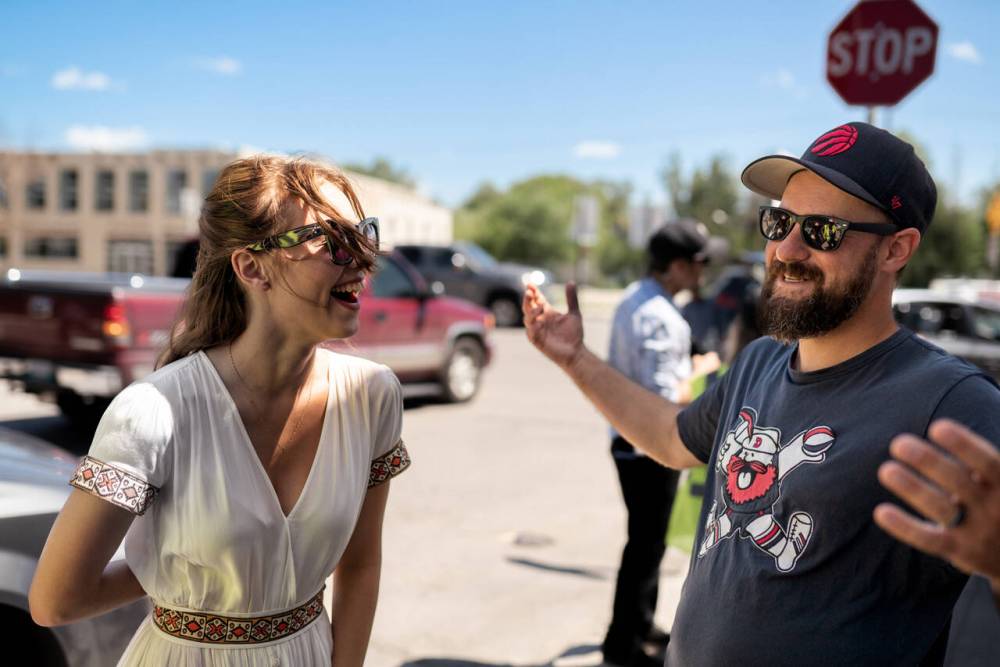
Since then, Russia’s invasion of Ukraine and the plight of Ukrainians have become top of mind for many around the world, especially in Winnipeg with its long history of Ukrainian immigration, much of it taking place on Selkirk Avenue.
The city is once again welcoming hundreds of Ukrainian newcomers, fleeing the war and giving Diaspora’s story added relevance. It has received strong reviews at film festivals in Montreal earlier this year and Dawson will present the movie at festivals around the world in 2023. A wider release hasn’t been announced.
Instead of asking about how the film was shot, Dawson says viewers ask him about the film’s story and emotions, as well as working with new actors, such as Guzhva, 23, who moved to Canada with her family 10 years ago.
In his travels on Selkirk Avenue, Dawson walked past the Palace Theatre, the old movie cinema that’s been closed for years, many times. The building’s fortunes have waned — it narrowly avoided demolition in June — just as Diaspora’s have begun to grow.
SUPPLIED Deco Dawson (left) directs actors Mateo Gubec and Yulia Guzhva.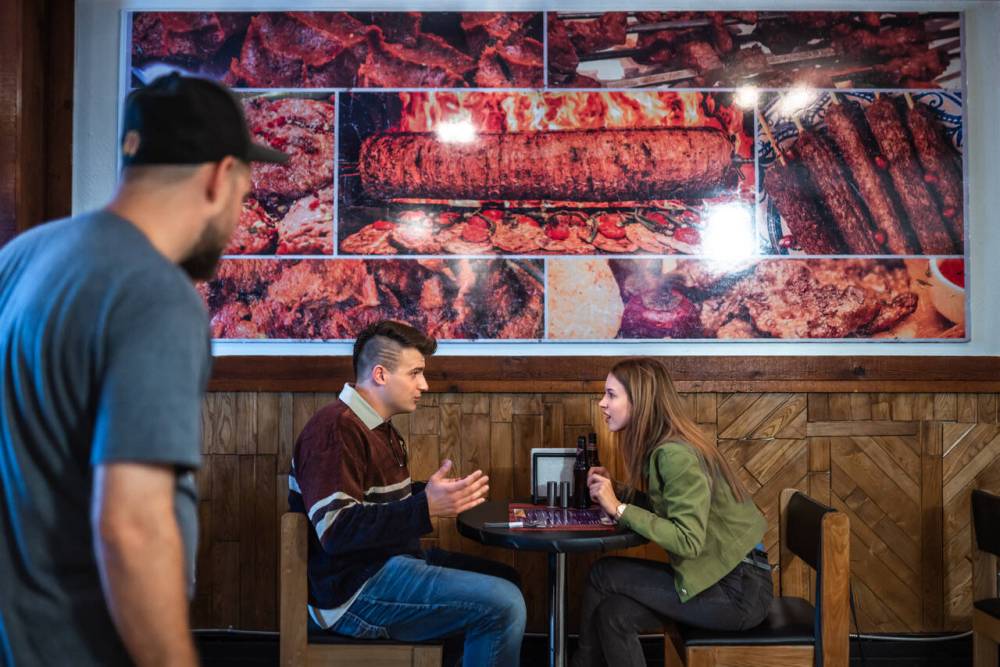
Instead the movie premières Wednesday night at Cinematheque, with funds raised from the screening going to the Charity Foundation of Serhiy Prytula, which provides military and humanitarian support in Ukraine.
“You know how many times I dreamed about premièring it at the Palace Theatre, thinking maybe we could get it for a bit and open it up and see what kind of magic could happen?” Dawson says.
“If one day in the film’s history it gets to showcase at the Palace Theatre, that’ll be the right time and place and make me so happy.”
Alan.Small@freepress.mb.ca
Twitter: @AlanDSmall
If you value coverage of Manitoba’s arts scene, help us do more.
Your contribution of $10, $25 or more will allow the Free Press to deepen our reporting on theatre, dance, music and galleries while also ensuring the broadest possible audience can access our arts journalism.
BECOME AN ARTS JOURNALISM SUPPORTER
Click here to learn more about the project.

Alan Small has been a journalist at the Free Press for more than 22 years in a variety of roles, the latest being a reporter in the Arts and Life section.
Our newsroom depends on a growing audience of readers to power our journalism. If you are not a paid reader, please consider becoming a subscriber.
Our newsroom depends on its audience of readers to power our journalism. Thank you for your support.


